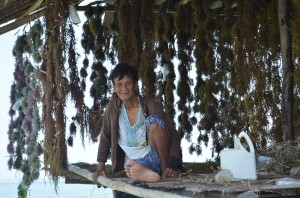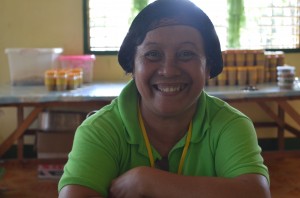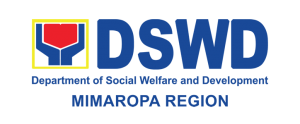
The working class. The tired. The small-earners. The ever-hopeful. The perpetually optimistic. The dreamers. These people are among us. They are the mirroring image of an economically challenged nation – a spitting reflection of a struggling Juan. The poor. The receiving end of charity works.
Poverty may have crippled many a people, but to a few, it grows into a great driving force. Lydia and Paz, are among many struggling residents from poor barangays in Taytay, Palawan. They are two women of colorful backgrounds. They belong to what the government refer to as the marginalized sector – the poor. Yet, all these women break the archetypal characterization of a poor person. When they speak of their struggles, they smile and laugh off what everyone would have sulked about.
Life’s a beach
To 64 year-old Lydia Obiña, life is a walk on a beach. “Mahirap ka na ipinanganak eh, mahirap na ngang maging mahirap magrereklamo ka pa, magtrabaho na lang kung ano kayang trabahuhin. Wala naman magagawa ang pag-awa sa sarili,” said Lydia while tinkering ropes for her seaweed farm. It was mid-morning, she and her husband are out in the middle of the sea harvesting seaweeds. They had attended the training conducted by the Department of Welfare and Development’s (DSWD) Sustainable Livelihood Program (SLP) in cooperation with Bureau of Fisheries and Aquatic Resources (BFAR) on Seaweeds Farming.
Lydia thankfully shared how their family’s earning had doubled after learning an innovative way of farming seaweeds. “Nung una kung ano lang nakaugalian namin sa pagtatanim, ganun lang ginagawa namin. Madalas nalulugi kami kapag binagyo. Ngayon yung turo sa amin na MVL [multiple vertical lines], ng BFAR eh nakatulong para hindi maapektuhan pananim namin kapag bagyuhan,” said Lydia. Her seaweed farming had helped their family support her daughter’s college education who had recently finished school. “Malaking tulong, lalo na at wala naman kaming ibang alam na gawin kundi ang mag-seaweed,” she added.
The Obiñas earn at least Php20, 000 from marketing their harvested seaweeds. To a family of three, the amount seems to be of great value. But to Filipinos customary action, Lydia is generously helping a few of her relatives who are in dire need of financial support. She recalled the times when they were receiving help from relatives as well, and she felt indebted to return to favor.
Moreover, the couple are very much settled to the kind of life they have built for their family. “Nakatapos na ang anak ko at kami naman ay nagtatrabaho para makadagdag sa ipon at matulungan ang anak namin na makahanap ng trabaho,” Lydia said. At her age, Lydia had not shown sign of physical weakness. Farming is a job that requires great physical strength, and for a person who has been in the business for over 20 years, Lydia has proven to be fit at 64. “Mas nakakabata yata kapag masaya ka sa ginagawa mo,” she said smiling.
A mother, a leader
Paz, like Lydia, had benefited from various skills enhancement training conducted by SLP. Her journey was different, in a way that she gained more than skills from cashew production training – she became a leader.

Her face is that of a person who seemingly have a smile on default. Paz is a rare combination of timid yet naturally bubbly personality. When she speaks of her life experiences and the hardships she went through, Paz managed to smile in between and ends most of her stories in giggles.
“Mananahi po ako noon, at talagang hirap na hirap po kumita ng pera,” she recalled. Paz was a tailor, and in a town where ukay-ukay is largely available, there’s a very small chance that a tailor will be needed for clothing. “Minsan may kita, minsan naman ay wala, pero wala naman akong ibang alam na trabaho kundi yoon,” she said forcing a grin. She was very eager to find a regular job as she has a family to support.
Paz felt fortunate to have taken part in Cashew Production Training and took it as an opportunity for a stable job. “Nung nabalitaan kong may training, talagang ginawan ko ng paraan para makakumpleto ng attendance,” said Paz. She coped by asking her neighbors to attend to her kids during training hours. “Gustong-gusto ko po talaga na mabuo yung training, yung iba kong kakilala eh hindi nagtapos, pero ayoko panghinaan ng loob,” she relayed.
Her persistence paid off, as today, Paz is a Parent Leader and the Center Manager for Processing in Taytay Cashew SEA –Kaunlaran Association. The organization produces variety of cashew products such as, cashew butter, salted and roasted cashew nuts, cashew brittle and cashew polvoron. These products are sold to tourists and neighboring towns. “Nakakatuwa na sa araw-araw meron kang dahilan para gumising, ito na yung inaantay kong regular na trabaho,” she said joyfully.
Paz recollected the time in September when they had just started production of cashew. As any first time business venture, it suffered. “Wala po kaming alam saan ibenta yung mga ginawa namin, napanghinaan na nga po kami ng loob at sabi namin parang hindi naman ito mabebenta at walang bumibili,” she assumed. In a true sense of team work the first set of produced products were bought by members of the association in order to breakeven.
The business gradually picked up and today, they earn at least Php100, 000 a month from selling the cashew products. Through her active involvement in building the cashew production business, Paz developed a sense of leadership. When most of her peers voted for her to become the center manager, she immediately took on the position. Being a leader to at least 1, 595 members, she gained a stronger sense of self. “Mas pakiramdam ko na nakakatulong ako hindi lang sa aking pamilya pero sa iba din,” she proudly admits.
Wisdom of the poor
The Philippines is a struggling nation. There are multitude of stories from people living below the poverty line that are both inspiring and heartbreaking. There are some like Lydia and Paz, who did not lose hope and instead continued to live and find a way to betterment.
Lydia and Paz may have been classified as poor. Most of them are tired from fighting a day-to-day battle to survival but they do not lose hope. They do not earn big, but continue to work and find work anyway. They are acutely aware of the life circumstances they’re in, and yet look into the future with great positivity. They had been through the most trying times of their lives but smiled and moved on.
To some degree, there is wisdom in poverty.
![]()


